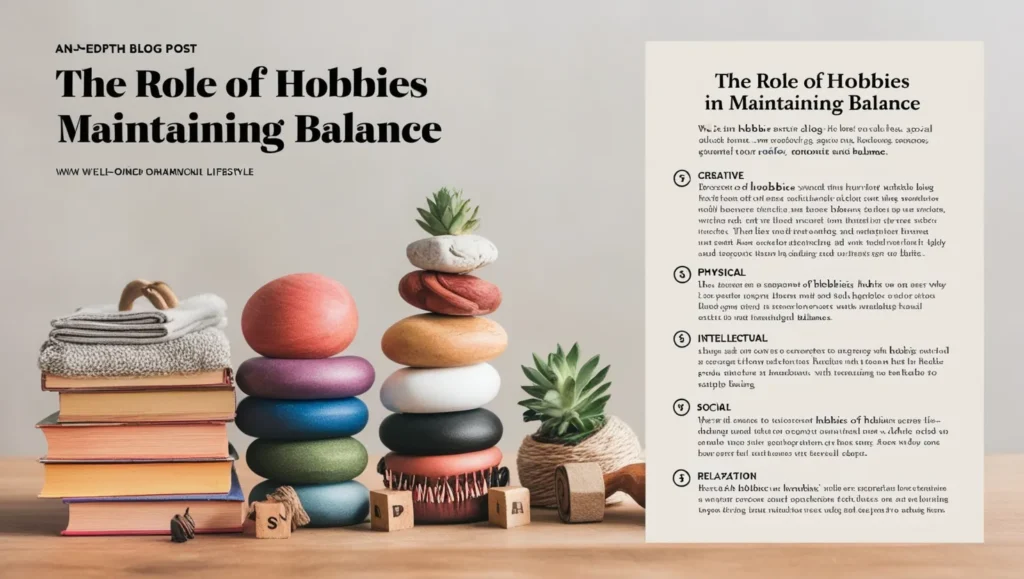The Role of Hobbies in Maintaining Balance A Path to a Well-Rounded Life
In today’s fast-paced world, maintaining balance in life is more challenging than ever. Between work, family, and other responsibilities, people often neglect their personal well-being. Hobbies, however, offer a powerful antidote to stress and monotony, providing an outlet for creativity, relaxation, and personal growth. They are not merely pastimes but essential tools for achieving a balanced and fulfilling life.
Why Hobbies Matter
Hobbies are activities we pursue for enjoyment, outside of our daily obligations. Whether it’s painting, gardening, playing an instrument, or hiking, hobbies allow us to focus on what we love. They are more than just leisure; they contribute significantly to our mental, emotional, and physical well-being.
Here’s how hobbies help maintain balance in life:
- Stress Relief
Engaging in hobbies helps shift focus away from daily pressures, providing a mental escape. Creative or physical hobbies like painting, writing, or yoga trigger relaxation responses in the brain, reducing stress and promoting a sense of calm. - Improved Mental Health
Hobbies can combat anxiety and depression by fostering a sense of achievement and purpose. Activities such as journaling, crafting, or learning a new skill enhance self-esteem and provide an outlet for expressing emotions. - Physical Health Benefits
Active hobbies like cycling, swimming, or dancing promote physical fitness, improve cardiovascular health, and boost overall energy levels. Even hobbies like gardening can contribute to physical activity while connecting us with nature. - Social Connections
Many hobbies, such as team sports, book clubs, or community volunteering, encourage social interaction. These activities help build meaningful relationships, reduce feelings of loneliness, and enhance a sense of belonging. - Boosted Creativity and Productivity
Hobbies stimulate the mind, fostering creativity and innovation. Engaging in creative pursuits can lead to fresh perspectives and ideas, which can be beneficial in other areas of life, including work and problem-solving. - Work-Life Balance
Incorporating hobbies into your routine helps set boundaries between professional and personal life. They act as a buffer, ensuring that work-related stress doesn’t consume your personal time.
Types of Hobbies and Their Benefits
1. Creative Hobbies
Examples: Painting, writing, photography, crafting.
Benefits: Encourage self-expression, boost problem-solving skills, and provide emotional release.
2. Physical Hobbies
Examples: Hiking, yoga, dancing, martial arts.
Benefits: Improve fitness, release endorphins (the body’s natural mood lifters), and enhance physical resilience.
3. Intellectual Hobbies
Examples: Reading, solving puzzles, learning a new language, coding.
Benefits: Keep the brain sharp, improve memory and focus, and encourage lifelong learning.
4. Social Hobbies
Examples: Team sports, volunteering, participating in clubs.
Benefits: Strengthen social networks, build teamwork skills, and create a sense of community.
5. Relaxation Hobbies
Examples: Meditation, gardening, knitting, fishing.
Benefits: Promote mindfulness, reduce anxiety, and create a sense of tranquility.
How to Incorporate Hobbies into Your Life
- Identify Your Interests
Think about activities that excite you or that you’ve always wanted to try. Experiment with different hobbies to find what resonates with you. - Make Time
Set aside dedicated time for your hobbies, even if it’s just 15-30 minutes a day. Treat this time as non-negotiable, just like work or exercise. - Start Small
Begin with simple activities that don’t require a lot of resources or preparation. For instance, start with a small sketchpad if you’re interested in art or take a short walk if you want to explore hiking. - Join Communities
Connect with like-minded individuals through local clubs or online groups. Sharing your hobby with others can enhance your experience and keep you motivated. - Stay Consistent
Like any habit, hobbies require consistency. Set realistic goals to ensure you stay engaged without feeling overwhelmed.
Balancing Hobbies with Responsibilities
While hobbies are essential, balance is key. Here are some tips:
- Prioritize your time effectively by scheduling hobby time around your existing commitments.
- Combine hobbies with daily activities, such as listening to audiobooks while commuting or gardening with family members.
- Avoid overcommitting to multiple hobbies at once. Focus on a few that truly bring you joy.
Real-Life Stories of Hobbies Transforming Lives
- The Busy Professional: A corporate manager found balance by taking up photography. It allowed him to disconnect from work stress and develop a new creative skill that he now shares through social media.
- The Stay-at-Home Parent: A mother struggling with the monotony of routine rediscovered her love for painting. It became her daily retreat and a source of supplemental income through commissioned work.
- The Retiree: A retiree embraced gardening, transforming her backyard into a lush sanctuary. The physical activity kept her healthy, and the sense of accomplishment boosted her happiness.
Final Thoughts
Hobbies are not just a way to pass the time—they are a vital part of maintaining a balanced, fulfilling life. They nurture your mind, body, and soul, offering respite from daily demands while enriching your personal growth. By embracing hobbies, you open the door to a healthier, happier, and more harmonious version of yourself.
Make time for what you love, and watch as the simple act of pursuing a hobby transforms your life for the better.

